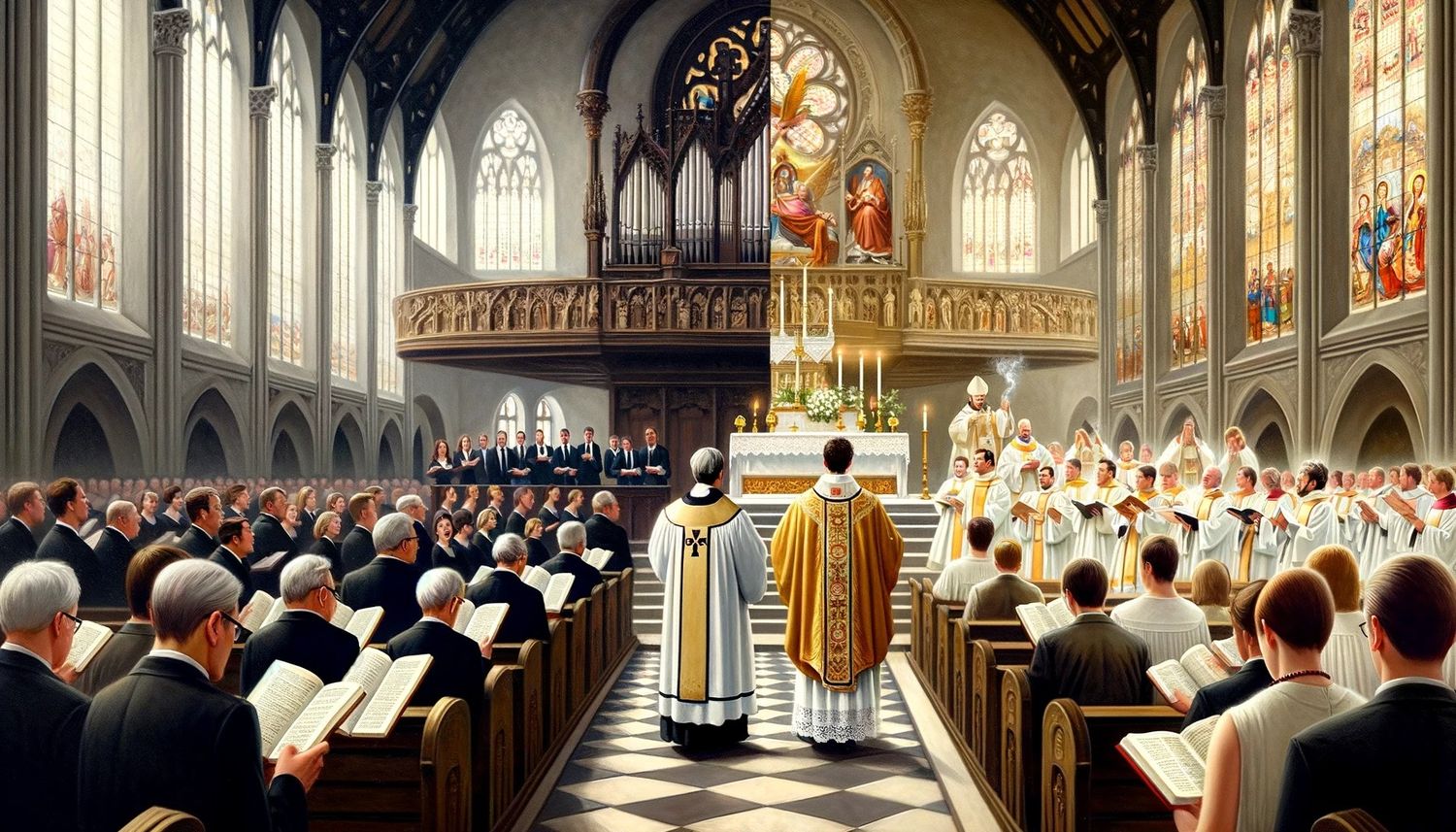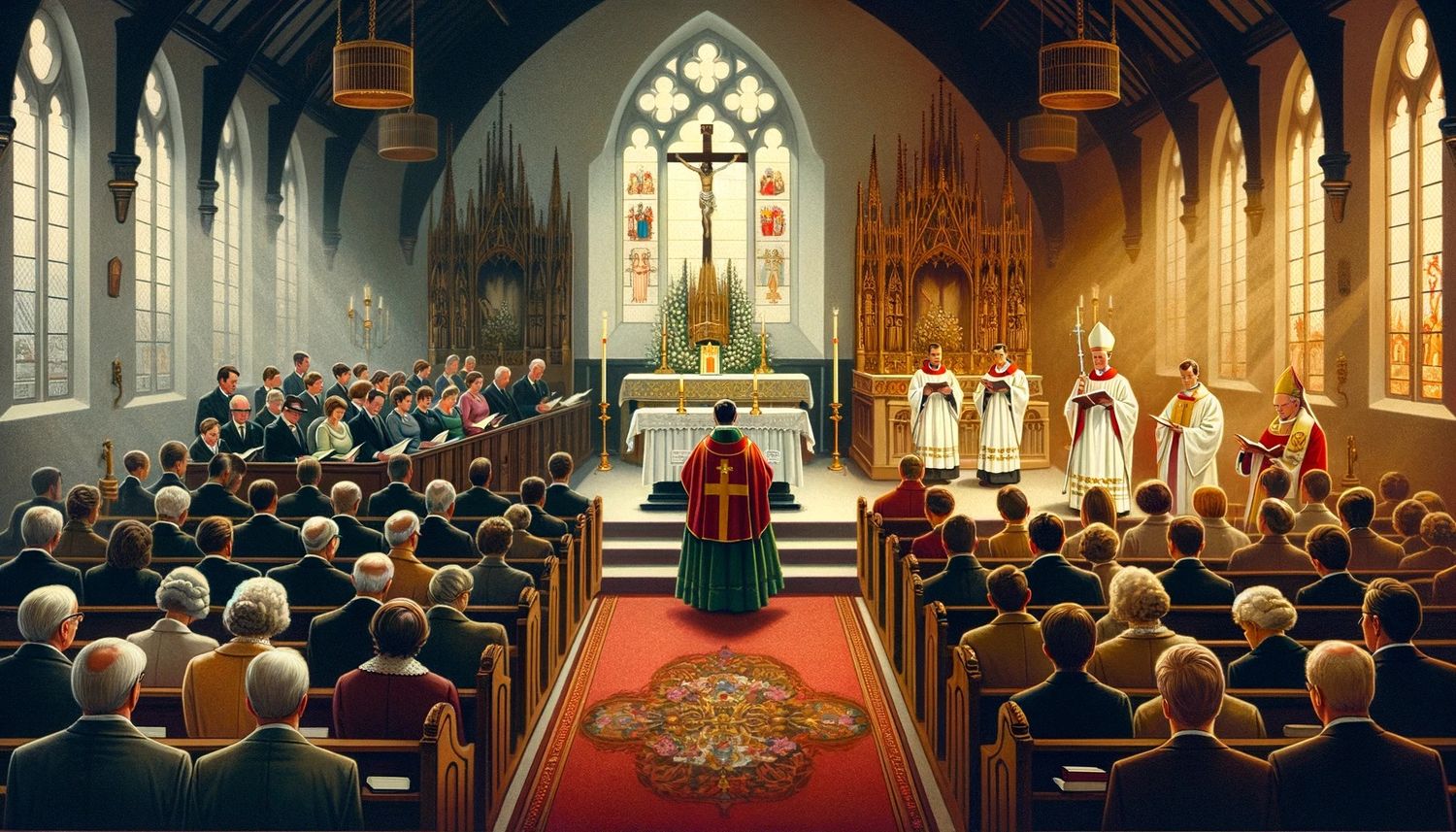Home>Theology and Spirituality>How Does Church Of Christ Differ From Baptist


Theology and Spirituality
How Does Church Of Christ Differ From Baptist
Published: February 21, 2024
Ericka Andersen, an editor at Christian.net, expertly merges digital strategy with content creation, focusing on faith and societal issues. Her communication skills enhance the platform's engaging narratives, fostering meaningful dialogue on belief's impact on society.
Discover the key differences in theology and spirituality between the Church of Christ and Baptist denominations. Explore their distinct beliefs and practices.
(Many of the links in this article redirect to a specific reviewed product. Your purchase of these products through affiliate links helps to generate commission for Christian.net, at no extra cost. Learn more)
Table of Contents
Introduction
When it comes to matters of faith and spirituality, the differences in beliefs and practices among various Christian denominations can be both intriguing and enlightening. Two prominent denominations that often spark curiosity and inquiry are the Church of Christ and the Baptist church. While both are rooted in the Christian faith and share fundamental beliefs, they also exhibit distinct theological perspectives and worship traditions.
Exploring the nuances between the Church of Christ and the Baptist denomination can provide valuable insights into the diverse expressions of Christianity. From their doctrinal variances to their approaches to worship and salvation, delving into these differences can foster a deeper understanding of the rich tapestry of Christian traditions.
In this comprehensive exploration, we will delve into the core disparities between the Church of Christ and the Baptist denomination. By examining their beliefs, worship practices, church organization, views on salvation and baptism, as well as their differences in communion and the Lord's Supper, we aim to shed light on the unique characteristics that distinguish these two Christian traditions.
Through this exploration, readers will gain a nuanced understanding of the distinct theological and practical elements that shape the identities of the Church of Christ and the Baptist denomination. This journey of discovery promises to unveil the beauty of diversity within the Christian faith, offering a glimpse into the multifaceted nature of religious expression and belief.
Beliefs and Doctrines
The Church of Christ and the Baptist denomination, while both firmly grounded in the Christian faith, hold distinct beliefs and doctrines that shape their theological frameworks and spiritual outlooks. Understanding these foundational principles is essential in comprehending the unique identities of these two Christian traditions.
Church of Christ
The Church of Christ places a strong emphasis on the authority of the New Testament as the sole guide for faith and practice. This commitment to biblical authority is reflected in their belief that the New Testament serves as the definitive source for understanding God's will and the principles of Christian living. They hold that the New Testament provides a blueprint for the organization and worship of the church, emphasizing a return to the practices of the early Christian church as described in the Scriptures.
Furthermore, the Church of Christ upholds the belief in the essentiality of baptism for salvation. They assert that baptism by immersion is a crucial step in the process of salvation, viewing it as the moment when an individual's sins are washed away, and they are united with Christ. This conviction is deeply rooted in their interpretation of biblical passages, particularly those that underscore the significance of baptism in the early church.
Baptist Denomination
In contrast, the Baptist denomination espouses distinct doctrinal tenets that set it apart within the landscape of Christian traditions. Central to Baptist beliefs is the concept of believer's baptism, which emphasizes the practice of baptizing individuals who have professed their personal faith in Jesus Christ. This act of believer's baptism symbolizes the individual's identification with Christ's death, burial, and resurrection, signifying their commitment to a life of discipleship.
Moreover, Baptists uphold the principle of congregational governance, affirming the autonomy of each local church in matters of faith and practice. This emphasis on congregational autonomy grants each church the freedom to discern and decide on theological and practical matters independently, reflecting the Baptist commitment to the priesthood of all believers and the democratic nature of church governance.
In essence, while both the Church of Christ and the Baptist denomination share foundational Christian beliefs, their distinct doctrinal emphases and interpretations contribute to the rich tapestry of Christian diversity. These theological nuances not only shape their respective identities but also offer valuable insights into the multifaceted expressions of faith within the broader Christian tradition.
Worship Practices
The worship practices of the Church of Christ and the Baptist denomination reflect their distinctive theological perspectives and cultural expressions of faith. These worship traditions serve as integral components of their spiritual identities, shaping the communal experiences and expressions of devotion within their respective congregations.
Church of Christ
In the Church of Christ, worship is characterized by a commitment to simplicity and adherence to New Testament principles. The order of worship typically includes acapella singing, a practice deeply rooted in the belief that the early Christian church engaged in vocal praise unaccompanied by musical instruments. This emphasis on vocal praise as the sole musical expression in worship reflects the Church of Christ's dedication to preserving the worship practices of the early church as described in the New Testament.
Additionally, the observance of the Lord's Supper holds a central place in the worship gatherings of the Church of Christ. This practice, often referred to as the communion, is typically conducted every Sunday and is regarded as a solemn remembrance of Christ's sacrifice. The congregation partakes of unleavened bread and the fruit of the vine, symbolizing the body and blood of Jesus Christ, in accordance with New Testament accounts of the Last Supper.
Prayer also occupies a significant role in Church of Christ worship, with congregants engaging in collective and individual prayers as a means of communing with God and seeking spiritual guidance. The emphasis on participatory worship, where members of the congregation actively engage in various aspects of the service, underscores the communal nature of worship within the Church of Christ.
Baptist Denomination
In the Baptist tradition, worship practices are characterized by a blend of reverence, congregational participation, and a focus on biblical preaching. Hymn singing, accompanied by musical instruments, is a prominent feature of Baptist worship services, reflecting a rich tradition of congregational praise and musical expression. The use of musical instruments in worship is embraced as a means of enhancing the collective praise and adoration of God.
Baptist worship services also place a strong emphasis on expository preaching, where the Scriptures are expounded upon in a systematic and in-depth manner. The sermon holds a central place in Baptist worship, serving as a means of instructing, inspiring, and challenging congregants in their faith journey. The sermon often addresses relevant theological, ethical, and practical aspects of Christian living, aiming to edify and equip the congregation for spiritual growth and discipleship.
Furthermore, Baptists observe believer's baptism as a significant aspect of their worship practices. The public profession of faith and the subsequent immersion of believers in water symbolize their identification with Christ's death and resurrection, signifying a profound spiritual commitment within the worship context.
In essence, the worship practices of the Church of Christ and the Baptist denomination encapsulate the diverse expressions of Christian devotion, reflecting their unique theological emphases and cultural traditions. These worship traditions serve as vital conduits for communal worship, spiritual edification, and the celebration of shared faith within their respective faith communities.
Church Organization and Leadership
The organizational structure and leadership dynamics within the Church of Christ and the Baptist denomination play pivotal roles in shaping the governance and decision-making processes of their respective congregations. These structural elements not only reflect their theological convictions but also influence the functioning and direction of the church community.
Church of Christ
In the Church of Christ, the organizational framework is characterized by a commitment to the New Testament model of church organization. This adherence to biblical principles is manifested in the autonomous nature of each local congregation, where individual churches operate independently without a central governing body. Each congregation is self-governing, with elders and deacons assuming leadership roles within the church community.
Elders, also referred to as pastors or overseers, are responsible for providing spiritual guidance, shepherding the congregation, and ensuring the doctrinal integrity of the church. Their leadership is grounded in the biblical qualifications outlined in the New Testament, emphasizing qualities such as wisdom, moral integrity, and a deep understanding of Scripture. Deacons, on the other hand, are tasked with practical matters and serving the needs of the congregation, contributing to the holistic functioning of the church community.
The emphasis on a plurality of elders, rather than a single pastor, reflects the Church of Christ's commitment to shared leadership and accountability within the church. This model of leadership aims to uphold the biblical principles of servant leadership and mutual oversight, fostering a sense of spiritual care and communal responsibility among the elders.
Baptist Denomination
In the Baptist tradition, the organizational structure is characterized by congregational autonomy and democratic decision-making processes. Each local Baptist church operates independently, with its congregation exercising authority in matters of faith and practice. This congregational governance model reflects the Baptist commitment to the priesthood of all believers and the freedom of individual churches to discern and decide on theological and practical matters.
Leadership within Baptist churches often includes the roles of pastors and deacons. Pastors, also known as ministers or reverends, assume spiritual leadership and pastoral care responsibilities within the congregation. They are entrusted with preaching, teaching, and providing spiritual guidance to the church community, aligning with the Baptist emphasis on the authority of Scripture and the proclamation of the Gospel.
Deacons play a supportive role in the practical functioning of the church, engaging in acts of service, benevolence, and administrative duties. Their service reflects the Baptist commitment to servant leadership and the holistic care of the church community, encompassing both spiritual and practical dimensions of ministry.
In essence, the organizational structures and leadership dynamics within the Church of Christ and the Baptist denomination reflect their distinct approaches to church governance and leadership. These structural elements not only embody their theological convictions but also shape the communal dynamics and decision-making processes within their respective congregations, contributing to the rich tapestry of Christian diversity and expression.
Views on Salvation and Baptism
The perspectives of the Church of Christ and the Baptist denomination on salvation and baptism are central to their theological frameworks and spiritual practices. These views not only underscore their distinct understandings of the redemptive process but also shape the rituals and beliefs that define their faith communities.
Church of Christ
In the Church of Christ, the concept of salvation is intricately linked to the act of baptism by immersion. Central to their belief system is the conviction that baptism is an essential step in the process of salvation. According to their interpretation of biblical teachings, baptism serves as the moment when an individual's sins are washed away, and they are united with Christ in His death and resurrection. This understanding aligns with their commitment to adhering closely to the practices of the early Christian church as described in the New Testament.
Furthermore, the Church of Christ emphasizes the necessity of a genuine, obedient response to the Gospel message, viewing baptism as the pivotal moment when an individual publicly demonstrates their faith and commitment to Christ. This act of immersion is regarded as the point at which a person enters into a new covenant relationship with God, marking the beginning of their journey as a disciple of Christ.
Baptist Denomination
In contrast, the Baptist denomination espouses the belief in believer's baptism, which emphasizes the immersion of individuals who have professed their personal faith in Jesus Christ. Baptism is viewed as a symbolic act that signifies a believer's identification with Christ's death, burial, and resurrection. This symbolic immersion represents a public declaration of one's faith and commitment to a life of discipleship, reflecting the Baptist emphasis on the autonomy of the local church and the priesthood of all believers.
Moreover, Baptists uphold the belief that salvation is rooted in a personal, faith-based relationship with Jesus Christ. They emphasize the significance of repentance and faith as essential components of the salvation experience, viewing baptism as an outward expression of an inward transformation. This understanding aligns with their commitment to the authority of Scripture and the belief in the individual's responsibility to respond to the Gospel message in faith and obedience.
In essence, while both the Church of Christ and the Baptist denomination affirm the significance of baptism in the Christian journey, their distinct views on the mode and theological implications of baptism reflect their unique theological emphases and interpretations of Scripture. These perspectives on salvation and baptism not only shape their doctrinal frameworks but also inform the spiritual practices and rituals that define their worship and communal life.
Differences in Communion and Lord's Supper
The observance of communion, also known as the Lord's Supper, holds significant theological and ritualistic differences between the Church of Christ and the Baptist denomination. These distinctions not only reflect their unique interpretations of the New Testament but also shape the communal worship practices and spiritual symbolism within their respective faith communities.
In the Church of Christ, the observance of the Lord's Supper is characterized by its frequency and solemnity. It is typically conducted every Sunday as an integral part of their worship gatherings. The emphasis on weekly communion stems from the Church of Christ's commitment to mirroring the practices of the early Christian church as described in the New Testament. The congregation partakes of unleavened bread and the fruit of the vine, symbolizing the body and blood of Jesus Christ, in accordance with New Testament accounts of the Last Supper. This practice underscores the Church of Christ's dedication to preserving the traditions and rituals of the early church, emphasizing the centrality of the Lord's Supper in their communal worship experience.
In contrast, the Baptist denomination approaches communion with a distinct theological perspective and ritualistic expression. While the frequency of communion may vary among Baptist congregations, the symbolic significance of the Lord's Supper remains central to their worship practices. Baptists view the observance of communion as a symbolic remembrance of Christ's sacrificial death and a celebration of the new covenant established through His blood. The act of partaking of the bread and the cup serves as a poignant symbol of Christ's redemptive work and the spiritual unity of believers. This symbolic understanding of communion aligns with the Baptist emphasis on the priesthood of all believers and the individual's personal relationship with God, emphasizing the communal aspect of the Lord's Supper as a unifying expression of faith within the congregation.
Furthermore, the Church of Christ's acapella singing during communion and the Baptist denomination's inclusion of hymns and musical accompaniment reflect their distinct worship traditions and cultural expressions of faith. These musical elements not only enhance the worship experience but also contribute to the spiritual ambiance and communal participation during the observance of the Lord's Supper.
In essence, the differences in the observance of communion and the Lord's Supper between the Church of Christ and the Baptist denomination encapsulate their unique theological perspectives and ritualistic expressions. These differences not only enrich the tapestry of Christian diversity but also underscore the multifaceted nature of communal worship and spiritual symbolism within the broader Christian tradition.
Conclusion
In conclusion, the exploration of the differences between the Church of Christ and the Baptist denomination unveils the rich tapestry of Christian diversity and theological expression. While both traditions share foundational Christian beliefs, their distinct doctrinal emphases, worship practices, church organization, views on salvation and baptism, as well as their differences in communion and the Lord's Supper, underscore the multifaceted nature of the Christian faith.
The Church of Christ's commitment to New Testament authority, the essentiality of baptism for salvation, and the preservation of early Christian worship practices reflects a deep reverence for biblical teachings and the historical roots of the Christian church. Their emphasis on acapella singing, weekly communion, and autonomous congregational governance shapes a worship experience characterized by simplicity, communal participation, and doctrinal fidelity.
Conversely, the Baptist denomination's emphasis on believer's baptism, congregational autonomy, and the priesthood of all believers reflects a commitment to individual faith, congregational decision-making, and the symbolic expression of spiritual unity. Their worship practices, including hymn singing, expository preaching, and the observance of communion as a symbolic remembrance, embody a blend of reverence, congregational participation, and a focus on biblical proclamation.
The organizational structures and leadership dynamics within the Church of Christ and the Baptist denomination reflect their distinct approaches to church governance, emphasizing shared leadership, congregational autonomy, and the priesthood of all believers. These structural elements not only embody their theological convictions but also shape the communal dynamics and decision-making processes within their respective congregations.
Furthermore, the perspectives on salvation and baptism, as well as the observance of communion and the Lord's Supper, highlight the theological nuances and ritualistic expressions that define the spiritual identities of the Church of Christ and the Baptist denomination. These differences not only enrich the tapestry of Christian diversity but also underscore the multifaceted nature of communal worship and spiritual symbolism within the broader Christian tradition.
In essence, the exploration of the differences between the Church of Christ and the Baptist denomination serves as a testament to the beauty of diversity within the Christian faith. It invites us to embrace the richness of theological perspectives, worship traditions, and communal expressions, fostering a deeper understanding and appreciation of the multifaceted nature of Christian belief and practice.












